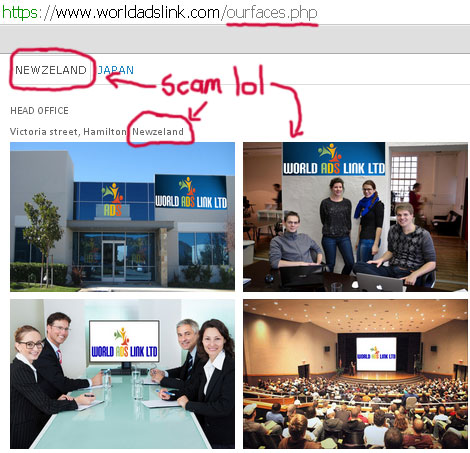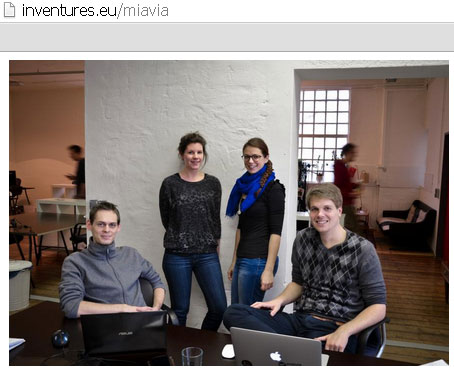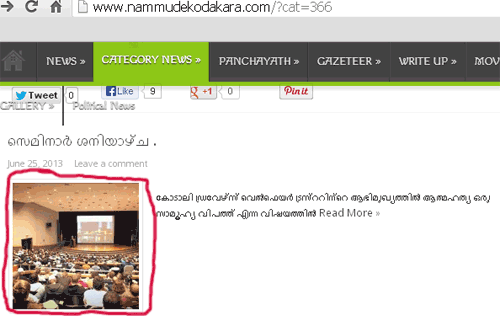President of Colombia orders WCM777 investigation

On the 26th of October Columbian news network Noticias Uno (“News One), aired on the “Canal Uno” (Channel One) network), ran a story about Ponzi investment scheme WCM777 being a pyramid scheme.
Noticias Uno’s report (screenshot below), [Continue reading…]
The Opportunity Network Review: Unaico rebooted
![]()
Unaico first popped up on my radar in April of 2011. Back then you had a pretty basic setup, with Unaico operating as an MLM business opportunity pegged to the social network SiteTalk.
Both companies were run by CEO Rune Evensen, with the plan being that SiteTalk would generate revenue and commissions via shopping purchases made within the network.
Both Unaico and SiteTalk came under the umbrella of the Enigro Group, headed up by founder Jarle Thorsen.
Upon reviewing Unaico in 2011 I found that the SiteTalk side of the business looked fair enough, however the virtual shares the company was offering was a huge red flag.
Jarle Thorsen has a history of involvement in several pyramid schemes (Worldwide Alliance , T5PC , World Games Inc. and PlexPay), and in Unaico this seemed to have manifested itself via the offering of virtual shares.
In a nutshell, affiliates deposited real money with the company and were issued shares. These shares were tradeable amongst affiliates, with their value pegged to nothing more than affiliate speculation.
On the 12th of May 2012, Unaico put out a “media release” in which they announced
SiteTalk – The Opportunity Community, today announced the new brand name of ‘OPN – The Opportunity Network’ that will be taking over the operations of the direct selling side of the business.
OPN was also pleased to launch at this convention SiteTalk 2.0 which is the latest version of the social media platform that drives the OPN business oportunity (sic).
SiteTalk 2.0 features new shopping “Deals” that allows SiteTalk users to take advantage of great shopping discounts created in their local markets.
An address in Singapore was provided at the end of the press-release, with further research indicating a boatload of confusion over where The Opportunity Network and SiteTalk are actually based.
As noted above, one of the addresses used by The Opportunity Network is ‘#17-01 The Arcade, Collyer Quay, Singapore‘. This is the same address used on the Opportunity Network website domain (“opn.com”) registration, indicating it is a primary address.
Yet if one visits The Opportunity Network’s website, a different PO Box address in the Cayman Islands (a known tax-haven) is provided:
OPN LTD
TMF(Cayman) Ltd.,
1st Floor, Windward 1,
Regatta Office Park,
P.O. Box 10338,
Grand Cayman KY1-1003,
Cayman Islands
Adding even further confusion to the mix is The Opportunity Network’s Policies and Procedures, which state
Members waive all rights to trial by jury or to any court. All arbitration proceedings shall be held in the United Kingdom.
Three different addresses in three different countries spanning three different continents, with no clarification provided on The Opportunity Network’s website.
Despite changing their name in 2012 and relaunching themselves, I didn’t get around to a review until recently due to a complete lack of information released about the specifics of The Opportunity Network as an MLM business opportunity.
I suspect that a major contributing factor of this was The Opportunity Network’s new position on affiliate marketing of the opportunity:
Members must not produce their own literature, advertisements, sales aids and promotional materials, or Internet web pages.
For an MLM opportunity pushing a social network, the prohibition of independent affiliate marketing certainly seemed strange.
That spurred me on to further research behind the company name change, which led me to the Wikipedia entry of Enigro Group. In Unaico’s May 2012 media release quoted above, here’s the official reason the company provides for the name change:
“We felt that our nickname – “The Opportunity Network”, describes well who we are as a company today, and what our main focus is, so we decided to formalise that identity and make it our new official name – OPN” announced Rune Evensen, CEO of OPN.
I think a far more probable reason however was likely due to the ongoing regulatory problems Unaico was experiencing.
Shortly after the launch of the company showed the first allegations of it being a pyramid scheme surfaced. Thorsen has a background of pyramid companies Worldwide Alliance , T5PC , World Games Inc. and PlexPay.
The Norwegian Gaming Board has not drawn a full conclusion about Enigro, but they have warned against participation in the company.
They said: “After having made a preliminary assessment of Enigro, the Gaming Board is of the opinion that the company has clear similarities with illegal pyramid scheme.”
In April 2010 the company received attention by the financial authorities of Slovenia issued a warning against Unaico where they stated that this company was authorized to offer its services in Slovenia. The same warning was issued by the government of Austria.
In October 2010 the company Deloitte issued a press release in which it was denied any cooperation with Unaico.
Deloitte issued the press release in response to Unaico and SiteTalk marketing material in which allegations that Deloitte was involved in helping Unaico with their IPO.
In-investor club is also on the Finance Authority’s list of companies are cautioned not to invest money in. They said: “The FSA notes that I-investor Ltd. is not authorized to provide investment services in Norway, and therefore lacks the license required under Norwegian law.”
The company is consequently on international notification lists.
Both Pakistani and Chinese authorities have given their residents official warnings against involvement with Unaico, referring to the company as an illegal pyramid schemes and scams.
See the Enigro Wikipedia entry (Norwegian) for a full set of reference links certifying the above statements.
Write off the name change as an “identity change” sure, but I’m sure regulatory warnings being issued around the world probably had something to do with it too.
As for what happened to SiteTalk’s virtual share offering, the company appears to have converted them over into real-world shares on the Cyprus Stock Exchange.
Initially The Opportunity Network had planned to list themselves on the British GXG Stock Exchange through the shell company “ST Communities”, however that plan fell through when the listing was terminated by GXG management.
ST Communities is a cash shell that is indeed on GXG
Markets however there is no way that the gentlemen in question would pass our screening process to be directors or controlling shareholders of a company on GXG should they attempt a reverse takeover.Kind regards
Simon Kiero-Watson
Head of Markets, GXG Markets
ST Communities were terminated ‘as a result of a significant breach of both the General Rules of the Market (Rule 1.1) and the Disclosure Requirements (Rule 5.2).‘
Despite this, The Opportunity Network ultimately blamed their affiliates for the termination:
Dear OPN Members,
The main reason for this being the fact that the OPN members have been continuing contacting GXG. We have continuous urged you NOT to take contact with the GXG stock exchange, but there are numerous people still contacting the head office of GXG. You all need to help us to make sure that all your members get this information and warnings.
The company has 10 days to appeal against this decision. Our listing team have meetings with GXG Markets in London today, and they will deliver an appeal to this notice.
We will get back to you once we have further updates.
Regards,
The Management Team
Whether or not an appeal was filed I don’t know but The Opportunity Network was never relisted on the GXG Markets Exchange.
Instead they got themselves listed on the Cyprus Stock Exchange under the shell company “Global Digital Services PLC” on the 19th of August 2013 (stock code: STC).
In March 2013 The Opportunity Network’s Chief Compliance Officer Frank Ricketts appeared in a video where he heavily criticised the company’s critics. Referring to the GXG listing failure as a “mistake”, Ricketts went on to claim “the bloggers” who reported the failure and anyone else who did their due diligence were “idiots”.
Today no mention of the Enigro Group, Jarle Thorsen, SiteTalk virtual share offering or Cyprus IPO is made on The Opportunity Network website, with the company only acknowledging Rune Evensen and Thomas Nordlund (“co-founder / network director of OPN”) in the footer of the company’s website.
The Norwegian Wikipedia entry for the Enigro Group advises that ‘in the fall of 2011 and early 2012, both companies (Enigro and Unaico) were dissolved and their websites closed‘.
Read on for a full review of The Opportunity Network MLM business opportunity. [Continue reading…]
Xalo Review: An opportunity within an opportunity?
![]()
Xalo launched in October 2013 as an independent division of parent MLM company Xango. Both companies are based out of the US state of Utah.
On the Xalo website (hosted as a subdomain of the Xango website), the company explains
XANGO is the opportunity company. With the introduction of XALO Ageless, we’ve cultivated a unique new opportunity that incorporates the industry’s most generous payment structures and maintains XANGO’s unprecedented 50/50 split.
XALO compensation is a volume-based plan filled with bonuses and incentives as early as 5K. It creates multiple streams of income based on recruiting, customer base and residual income. It’s got lifestyle bonuses, cash bonuses and a handful of other ways for you to earn more — and to learn it faster.
And the best part? You can work the XALO plan right alongside the XANGO plan.
In the absence of any executive management information provided on the Xalo website, it is assumed that the management structure of Xalo and Xango are one and the same.
For further information on the Xango MLM business opportunity (including company history and background information), head on over to the BehindMLM Xango Review (October 2013).
Otherwise, read on for a full review of the Xalo MLM business opportunity. [Continue reading…]
i-Payout defend handling TelexFree ewallet money
![]()
Following weeks of commission delays for non-Brazilian TelexFree affiliates just over a moth ago, ewallet provider Global Payroll Gateway (GPG) abruptly announced that they could ‘no longer support TelexFree‘.
The announcement was made in mid September, with GPG informing TelexFree’s affiliates that International Payout Systems (i-Payout) would be taking over the supply of ewallet services to TelexFree.
No official reason was given for GPG’s dropping of TelexFree, however on their website GPG state
GPG maintains strict accordance with the USA Patriot act and a wide variety of other international financial regulatory and banking regulations.
GPG is very careful to follow all international regulations and laws concerning Anti-Money Laundering, Identity Protection and Payroll in general.
TelexFree is currently under criminal investigation in Brazil, with pending charges of money laundering and embezzlement being touted by Public Prosecutors.
About a month after my article on GPG dumping TelexFree went live I received an email from i-Payout, with the company wishing to clarify a few things.
In addition to informing me that I’d used the wrong domain to calculate their comparative size to GPG, i-Payout also insisted that they had
done a complete due diligence on TelexFree, assessed its needs, and confirmed the product as compliant with all US laws.
“Complete due diligence” you say? Go on… [Continue reading…]
Zeek affiliates urge eachother to blackmail government

I don’t know what’s up in Zeek Rewards ex-affiliate circles this week but after only days ago Robert Craddock dropped his “Zeek Rewards wasn’t a Ponzi scheme cuz we didn’t say it was” comedic bombshell, now we’ve got other angry Zeek Rewards net winners suggesting they should sue the government…
…and then use the lawsuit as blackmail leverage to get out of having to pay back their Zeek Ponzi winnings.
Want to know the grounds these Zeek Rewards affiliates are proposing they sue the government on? Read on… [Continue reading…]
World Ads Link Review: Ad Pack based Ponzi scheme

There is no information on the World Ads Link website indicating who owns or runs the business.
On the World Ads Link “about us” page, the company provides only the following vague marketing copy, written in poor English:
World Ads Link Limited is governed by skilled & apt professionals who are fully experienced that could deal with people in better career link with online advertisement & financial systems.
The World Ads Link website domain (“worldadslink.com”) was registered on the 24th of March 2013, however the domain registration is set to private.
World Ads Link does provide an “our faces” page on their website, with the company alleging to showcase photos from a “head office” in New Zealand and a secondary office in Japan.

The photos depicted on both office pages are unfortunately doctored up images, sourced from a variety of non-related websites.
The above screenshot is the “New Zeland (sic) Head Office” page, on which World Ads Link claims to have an office in Hamilton, New Zealand.
From left to right, here are the originals of the photoshopped images World Ads Link have used.
Image 1 is from the website of Strata Realty, showcasing the Corona Spectrum Business Center they have for lease in Corona, California:

Image 2 is from the start-up business venture “Miavia”, who market “handcrafted travel guides”:

Image 3 is a stock photo from the website “123RF”, titled “Group of male and female businesspeople seated at a table watching an online presentation on a computer screen” (through the back of their heads?):

And image 4 is from a website called “Nammudekodakara”, written in the Indian language Malayalam:

The fourth website World Ads Link have doctored their images from is of note, as Malayalam is a rather obscure language online and not recognised by Google Translate.
As noted above Malayalam is a language spoken in India, specifically in the state of Kerala. Meanwhile the Alexa website report for the World Ads Link domain reveals that 31% of the website traffic originates from India (no other country is significant enough to rank).
Putting all of this together, along with the poor English all over the World Ads Link website, I think it’s a safe bet to assume that whoever is behind the company is based out of India. Probably either in the state of Kerala itself or somewhere nearby.
As always, if an MLM company is not openly upfront about who is running or owns it, think long and hard about joining and/or handing over any money. [Continue reading…]
All Teamed Up Review: $25 matrix positions
![]()
All Teamed Up operate in the internet marketing MLM niche and appears to be based out of the Newfoundland in Canada.

Heading up All Teamed Up is Rodney Brace. Brace (right) credits himself as the “sole proprietor” of his marketing company “Top Dog Advantage”. On the All Teamed Up website, Brace explains
This Product Driven Income Plan is owned and operated by Top Dog Advantage Inc. We have been in business since 1999 and incorporated in 2007. I, Rodney Brace, am sole proprietor.
We have been developing software and services for a few years. We have been marketing even longer, promoting other company’s products and services.
Our goal as always been to create/promote products and services that help people be more successful in business, especially the home-grown-businesses and entrepreneurs.
We recently decided to package our products in a way that is the most cost effective for the consumer and still remain profitable for us.
Prior to releasing software through Top Dog Advantage in 2008, Brace states on the company’s website that
from 2001 – 2008 we worked with companies and individuals to assist them with branding their email communications professionally.
We suspended this service in March of 2008 so we could focus on more cutting edge technologies.
Read on for a full review of the All Teamed Up MLM business opportunity. [Continue reading…]
ZTeamBiz vow to “bring back” Zeek Ponzi excitement

Despite the hundreds of millions of dollars lost by affiliate investors in the Zeek Rewards Ponzi scheme, fourteen months after the SEC shut it down there are still those running around professing its legitimacy.
One such group is Robert Craddock’s ZTeamBiz who, in addition to swearing Zeek Rewards wasn’t a Ponzi scheme, look set to spearhead attempts to reintroduce the MLM industry to the Ponzi points revenue sharing model. [Continue reading…]
Indian Herbalife affiliates begging for shutdown?

When one considers the MLM industry globally, often at times it feels like the industry transitions through a simultaneous time-delay.
Typically due to a lack of legal precedents and litigation, as MLM spreads through countries of different economical tiers, I can’t help but observe the same issues and problems cropping up as they did years ago in other countries.
Those seeking to take advantageous of new markets use the same tactics deployed one or two decades ago by those that came before them in what are now well and truly established markets.
Some of these marketing tactics are legitimate… and some not so much.
One that falls squarely on the “not so much” side of things are outrageous claims made by an MLM company’s affiliates, typically deployed to talk up the benefits of a company’s product line.
Echoing product claims made over the past few decades in US markets that have seen numerous MLM companies penalised and, in some cases, permanently shutdown, Herbalife’s Indian distributors are apparently running around making all manner of medical promises. [Continue reading…]
SEC reiterate need for retail sales in MLM

As part of my writing here at BehindMLM I find myself sifting through mountains of MLM related information on a daily basis. One topic I find that pops up on a consistent basis is the debate over the importance (or lack thereof) of retail sales by an MLM company.
By using the term “retail sales” in MLM one is of course referring to sales of a product or service (not a third-party offering) by an MLM company to non-affiliates. Non-affiliates can be referred to as non-participants or any other name that denotes them as not participating in the compensation plan and earn commissions.
Some MLM companies attempt to muddy the clear definition of a retail customer by claiming that affiliates who do not recruit are retail customers. It is important to note that the failure to recruit new affiliates does not preclude an affiliate from generating commissions (typically by selling the company’s products), and as such they simply cannot be defined as retail customers (who simply cannot generate commissions no matter what they do or don’t do).
Here at BehindMLM it’s no secret the vital important I place on retail sales in my company reviews. The existence of retail sales and its viability is one of the key indicators I use in my analysis of an MLM company’s compensation plan and business model.
Adopting a common-sense approach to retail sales in MLM, I use a benchmark of around 50%, figuring that if a company can demonstrate that at least 50% of its revenue is from retail sales then they’re well-clear of being a pyramid scheme.
I mean, selling products to retail customers is what MLM is supposed to be about right? So is expecting a company to be at least 50% engaged in this unreasonable?
According to some MLM proponents, very much so.
One common assertion I see used time and time again is the insistence that US regulators do not care if products are being sold to retail customers or affiliates.
‘A product sale is a product sale and so long it is being purchased on the merit of the value of the product itself and not just to generate commissions‘, or some derivative is the common reasoning used.
The problem with that is of course that you then wind up companies operating in a loophole, ignoring retail altogether and focusing on generating recruitment commissions via product sales, with an inflation in product cost masking what would otherwise be a blatant recruitment incentive.
That however is conveniently ignored.
‘So long as a company is generating revenue via product sales, who cares whether customers or affiliates or retail non-paricipants?‘
Anyone who gives a damn about pyramid schemes operating in the MLM space should care.
If there’s no noticeable difference between a pyramid scheme set up to mask recruitment commissions paid out of inflated product prices, and an MLM company that professes legitimacy despite a lack of retail because commissions are generated via product sales – then the MLM industry has a huge problem.
But hey, that’s just me with my common-sense. I don’t have a sob story to tell you… there’s no rags to riches “I lived in a van in Hawaii for a decade eating my own shit to get by” backstory to BehindMLM. I’m just a guy with a keyboard trying to make sense of an industry that is notoriously treacherous to wade through, for the uninformed and informed alike.
The hell do I know about pyramid schemes? [Continue reading…]

